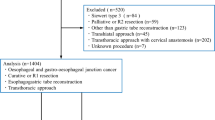Abstract
Background
Open esophagectomy (OE) in elderly patients with esophageal cancer is hazardous due to high surgical mortality and limited survival. The aim of this study was to explore whether minimally invasive esophagectomy (MIE) has perioperative or long-term benefits in elderly patients with esophageal cancer compared with OE.
Methods
Between February 2005 and June 2013, 407 patients older than 70 years underwent esophagectomy for esophageal cancer, including 89 who received MIE and 318 who received OE. A retrospective pair-matched study was performed to compare 116 patients (58 pairs) who underwent either OE or MIE. Patients were matched by age, sex, comorbidity, tumor location, histology, TNM stage, and operative approach. Perioperative and long-term outcomes were compared between the two groups.
Results
The overall incidence of postoperative complications was significantly lower in the MIE group than in the OE group (37.9 vs. 60.3 %, P = 0.016), especially incidence of pulmonary complications (20.7 vs. 39.7 %, P = 0.026). The mean length of hospital stay was also significantly shorter (10 days [range 7–70] vs. 12 days [range 8–106], P = 0.032). The perioperative mortality rate trended lower in the MIE group but was not significantly different (3.4 vs. 8.6 %, P = 0.435). Kaplan–Meier analysis showed that the median disease-specific survival time in the MIE group was significantly longer than in the OE group (>27 months [range 1–82] vs. 24 months [range 1–99], P = 0.003). No difference was found in overall survival (39 ± 8.9 vs. 22 ± 3.4 months, P = 0.070).
Conclusion
In surgical management of elderly patients with esophageal cancer, MIE is associated with lower rates of morbidity and pulmonary complications as well as longer disease-specific survival time. Whether it provides benefit to patients’ long-term survival requires further research.


Similar content being viewed by others
References
Luketich JD, Pennathur A, Awais O, Levy RM, Keeley S, Shende M et al (2012) Outcomes after minimally invasive esophagectomy: review of over 1000 patients. Ann Surg 256:95–103
Moskovitz AH, Rizk NP, Venkatraman E, Bains MS, Flores RM, Park BJ et al (2006) Mortality increases for octogenarians undergoing esophagogastrectomy for esophageal cancer. Ann Thorac Surg 82:2031–2036
Morita M, Otsu H, Kawano H, Kumashiro R, Taketani K, Kimura Y et al (2013) Advances in esophageal surgery in elderly patients with thoracic esophageal cancer. Anticancer Res 33:1641–1647
Kinugasa S, Tachibana M, Yoshimura H, Dhar DK, Shibakita M, Ohno S et al (2001) Esophageal resection in elderly esophageal carcinoma patients: improvement in postoperative complications. Ann Thorac Surg 71:414–418
Biere SS, van Berge HM, Maas KW, Bonavina L, Rosman C, Garcia JR et al (2012) Minimally invasive versus open oesophagectomy for patients with oesophageal cancer: a multicentre, open-label, randomised controlled trial. Lancet 379:1887–1892
Wang H, Feng M, Tan L, Wang Q (2010) Comparison of the short-term quality of life in patients with esophageal cancer after subtotal esophagectomy via video-assisted thoracoscopic or open surgery. Dis Esophagus 23:408–414
Smithers BM, Gotley DC, Martin I, Thomas JM (2007) Comparison of the outcomes between open and minimally invasive esophagectomy. Ann Surg 245:232–240
Nagpal K, Ahmed K, Vats A, Yakoub D, James D, Ashrafian H et al (2010) Is minimally invasive surgery beneficial in the management of esophageal cancer? a meta-analysis. Surg Endosc 24:1621–1629
Shen Y, Feng M, Khan MA, Wang H, Tan L, Wang Q (2014) A simple method minimizes chylothorax after minimally invasive esophagectomy. J Am Coll Surg 218:108–112
Shen Y, Zhang Y, Tan L, Feng M, Wang H, Khan MA et al (2012) Extensive mediastinal lymphadenectomy during minimally invasive esophagectomy: optimal results from a single center. J Gastrointest Surg 16:715–721
Feng M, Shen Y, Wang H, Tan L, Zhang Y, Khan MA et al (2012) Thoracolaparoscopic esophagectomy: is the prone position a safe alternative to the decubitus position? J Am Coll Surg 214:838–844
Jougon JB, Ballester M, Duffy J, Dubrez J, Delaisement C, Velly JF et al (1997) Esophagectomy for cancer in the patient aged 70 years and older. Ann Thorac Surg 63:1423–1427
Fang W, Igaki H, Tachimori Y, Sato H, Daiko H, Kato H (2001) Three-field lymph node dissection for esophageal cancer in elderly patients over 70 years of age. Ann Thorac Surg 72:867–871
Pultrum BB, Bosch DJ, Nijsten MW, Rodgers MG, Groen H, Slaets JP et al (2010) Extended esophagectomy in elderly patients with esophageal cancer: minor effect of age alone in determining the postoperative course and survival. Ann Surg Oncol 17:1572–1580
Yang HX, Ling L, Zhang X, Lin P, Rong TH, Fu JH (2010) Outcome of elderly patients with oesophageal squamous cell carcinoma after surgery. Br J Surg 97:862–867
Mariette C, Piessen G (2012) Is advanced age still a contra-indication to surgery for esophageal cancer? J Visc Surg 149:e163–e164
Cijs TM, Verhoef C, Steyerberg EW, Koppert LB, Tran TC, Wijnhoven BP et al (2010) Outcome of esophagectomy for cancer in elderly patients. Ann Thorac Surg 90:900–907
Abunasra H, Lewis S, Beggs L, Duffy J, Beggs D, Morgan E (2005) Predictors of operative death after oesophagectomy for carcinoma. Br J Surg 92:1029–1033
Dhamija A, Dhamija A, Hancock J, McCloskey B, Kim AW, Detterbeck FC et al (2014) Minimally invasive oesophagectomy more expensive than open despite shorter length of stay. Eur J Cardiothorac Surg. doi:10.1093/ejcts/ezt482
Ma JY, Wu Z, Wang Y, Zhao YF, Liu LX, Kou YL et al (2006) Clinicopathologic characteristics of esophagectomy for esophageal carcinoma in elderly patients. World J Gastroenterol 12:1296–1299
Acknowledgments
This work was supported by the National Natural Science Foundation of China (Grant No. 81370587).
Disclosure
Jingpei Li, Yaxing Shen, Lijie Tan, Mingxiang Feng, Hao Wang, Yong Xi, and Qun Wang declare no conflict of interest.
Author information
Authors and Affiliations
Corresponding author
Additional information
Jingpei Li, Yaxing Shen these authors contributed equally to this paper.
Rights and permissions
About this article
Cite this article
Li, J., Shen, Y., Tan, L. et al. Is minimally invasive esophagectomy beneficial to elderly patients with esophageal cancer?. Surg Endosc 29, 925–930 (2015). https://doi.org/10.1007/s00464-014-3753-x
Received:
Accepted:
Published:
Issue Date:
DOI: https://doi.org/10.1007/s00464-014-3753-x




